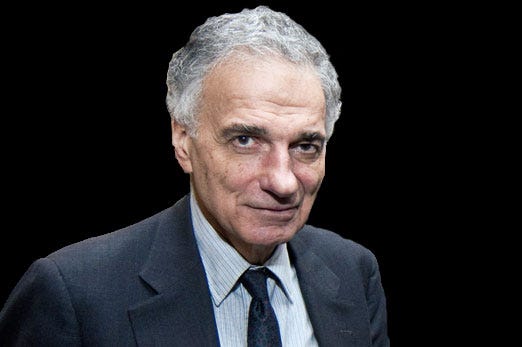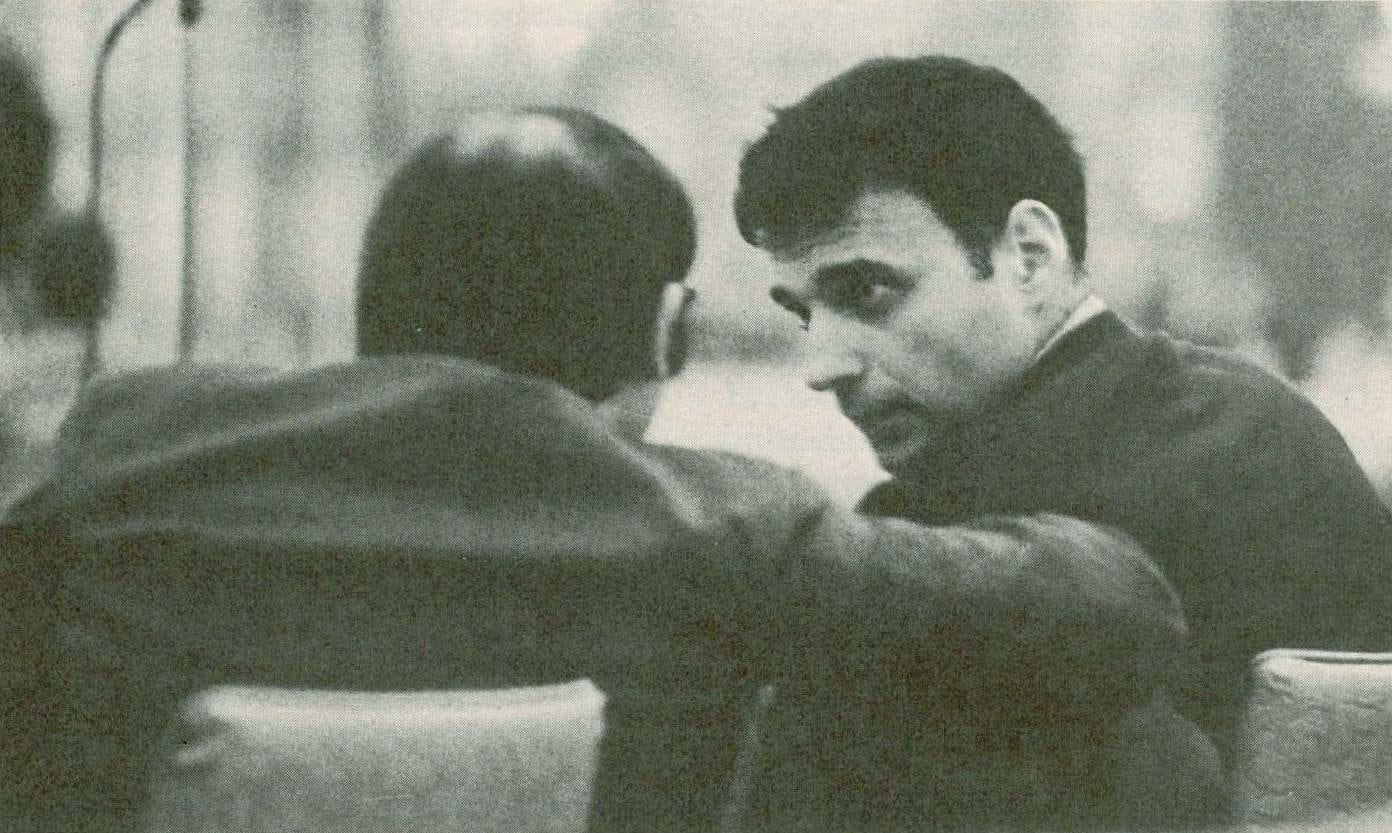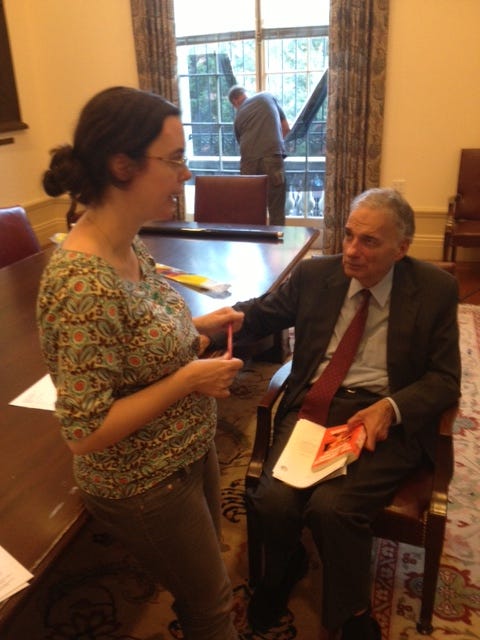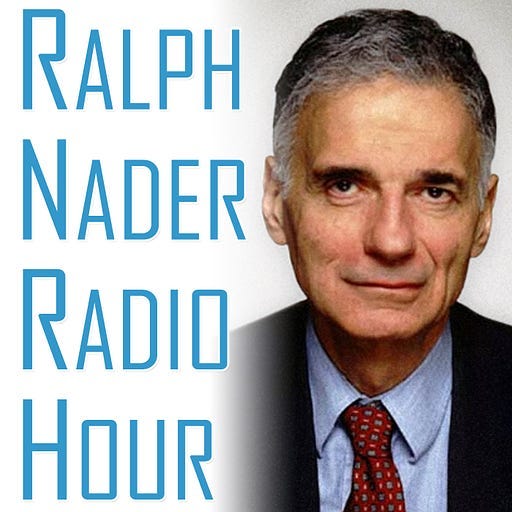Happy Birthday, Mr Nader
Notes on the legendary consumer advocate, anti-nuclear campaigner & former Presidential candidate as he turns 90
This week sees a major milestone birthday for
- the American political figure I think I can safely say has made the biggest impression on me personally over the past 25 years or so of my proper 'grown up life' (though I suppose, truth be told, Donald Trump would have to be in the mix vying for that title too – albeit for extremely different reasons!)I confess I was a little taken aback when I received a recent email newsletter containing a guest essay by him, which mentioned at the end that he was about to turn 90 years old! I guess I had him pegged in my mind somewhere around his mid-70s.
Honestly this is probably more a reflection of my failure to keep up with the relentless passage of the years (I still feel like I'm in my mid-30s rather than my late 40s!), than anything else.
But it certainly seemed like a fitting moment to write a few words about his fascinating career and achievements, which I sense may not be nearly so well known to most people outside the US, despite his regular appearance on various '100 Most Influential Americans' lists in such esteemed publications as the Atlantic, Time magazine and Life magazine, in his home country. 1

So let's start with the top line facts. Ralph Nader was born in Connecticut, on 27th February 1934, the child of Lebanese immigrants who ran a bakery and delicatessen and nurtured in their son an acute awareness of the need for critical thinking and active citizenship in a democracy.
After graduating from Princeton University and Harvard Law School, he set up his own legal practice at the end of the 1950s. His growing awareness of the abuse of corporate power prompted an increasing commitment to consumer protection and, in 1965, he came to national public attention for the first time, with the publication of his book, 'Unsafe at Any Speed: The Designed-In Dangers of the American Automobile'.
Nader pulled no punches in his criticism of the auto industry, which he showed to have continually prioritised profit over safety. The revelations in the book– coupled with the further explosive revelation that General Motors had hired private detectives to follow and discredit him – saw it become a major publishing sensation. More significantly, it helped usher in new safety legislation in the US, requiring important safety features like seatbelts and airbags as standard.

This was the first in a string of campaigns Nader took up on an array of consumer rights issues, including industrial hazards, pollution, federal trade, pension reform and – the area I'm most familiar with – nuclear safety.
By 1971, the same year he set up the public interest organisation he runs to this day, Public Citizen, he'd become such a thorn in the side of big business that the US Chamber of Commerce was warned of the threat he posed in a critical memo from American lawyer Lewis Powell, who wrote :
“Perhaps the single most effective antagonist of American business is Ralph Nader who - thanks largely to the media - has become a legend in his own time and an idol of millions of Americans.”
His campaigning had genuine impact. Through the 1970s and 80s, he was involved in the creation of the Environmental Protection Agency, the Occupational Safety and Health Administration and the Consumer Product Safety Commission and instrumental in the passage of legislation including the Freedom of Information Act, Foreign Corrupt Practices Act, Clean Water Act, Consumer Product Safety Act, and Whistleblower Protection Act.
And he became a genuinely well-known figure in mainstream US culture because of his work. Just check out this absolutely delightful clip of him on Sesame Street in 1988 as a 'person in your neighborhood' (he appears about 3 and a half minutes in but it's well worth watching the whole thing which also features Martina Navratilova and US news legend Barbara Walters!)
As for me, I first became aware of him as a 23 year old news and politics junkie in England at the start of my career in media, when he famously (some might say infamously) stood as the Green Party candidate in the US Presidential election of 2000 – you remember, the one with the 'hanging chads' and the seemingly endless ballot recounts in Florida.
Democrats and much of the media alongside them, seemed to want to lay the blame at Nader's door for Al Gore losing the election to George W. Bush. Looking on from afar, this seemed so puzzling to me – how could the self-styled bastion of democracy across the Atlantic be complaining about more democratic choice? Ah, how young and naïve I was back then!
It was only when I began researching around nuclear power a few years later, during the very early days of work on what ultimately became 'The Atom: A Love Affair', that I started to learn more about this straight talking man in a crumpled suit 2 who ruffled so many feathers (despite the accusations of him being a 'spoiler candidate', Nader stood again in both the 2004 and 2008 elections).
I ordered and read a vintage copy of his 1977 book 'The Menace of Atomic Energy' (pictured) and was thrilled when my request for an interview received a positive response from his team.
And so it was that on 13th Sept 2013, my cameraman Owen and I found ourselves arriving at the very grand surroundings of his Washington DC offices. I was 6 months pregnant with my son at the time and vividly remember chatting with Ralph about this and my journey to becoming interested in nuclear power, whilst Owen was busy hanging blackout blinds and coloured gel filters up on windows and positioning the lights and microphone ready for us to record.
The interview itself flew by. I was knocked out by Ralph's razor-sharp recall of facts from decades previous (much of our interview was focused on the 1970s and the Critical Mass Energy Project umbrella group he founded in those years as a locus for anti-nuclear campaigning), as well as his knowledge of current energy policy questions. I could have easily spent twice as long talking to him if his schedule had allowed.
In the years since I was lucky enough to meet him in person, he's continued to be active in a host of arenas – impressive for anyone, but not least for someone in their 80s. He's published numerous books (I definitely want to check out the Ralph Nader & Family Cookbook - I love Lebanese food!); he's opened a museum in his home town in Connecticut; campaigned for admissions reform at Harvard; and founded a new print-only newspaper, the Capitol Hill Citizen.
He's also been involved in campaigning against Boeing, following the 2019 crash of Ethiopian Airlines flight 302, which killed 157 people due to what Nader has called the 'criminal design' of the Boeing 737 MAX. It was a tragedy which touched him personally, as his grandniece Samya Stumo, a 24 year old nurse and public health worker, was one of the passengers on board who died. At the time of writing, almost 5 years after the crash, there have been some changes to airline regulation passed through Congress but the families' lawsuits remain stalled.
As the essay I linked to at the start shows, Nader is still absolutely engaged in the most pressing political threats of our times, from the climate emergency to further biological pandemics, from AI to weapons of mass destruction and unchecked, authoritarian regimes.
Whilst researching this essay, I found a recent article in the Washington Post (Ralph Nader is on the Line. Yes, he'll hold) describing how he still regularly contacts reporters both there and at the New York Times if he agrees or disagrees with their reporting or wants to fill them in on information he feels they've missed, or to suggest someone they should interview.
And he also still hosts and actively participates in topical discussions on his weekly Ralph Nader Radio Hour, which is now available to listen to right here on Substack.
Wherever you sit on the political spectrum (and he certainly has fans and critics alike on both the left and the right), you surely can't help but be impressed by the clarity of his conviction and of his communication.
I for one was sufficiently impressed to include his summary of the overall case made by anti-nuclear campaigners across the decades in the closing moments of my film. Here's a clip:
What a life. Happy 90th Birthday Mr Ralph Nader!
Watch my film on Netflix (in Europe) or Vimeo (everywhere else) - or see trailer, reviews & bonus content HERE
Find me on X /Twitter & at LinkedIn
Life stories website – coming soon...
It's also of a piece with my interest in and focus on life stories – I'm definitely up for writing more posts reflecting on/celebrating the lives of our present day elders, be they public figures or private individuals, so if you have any suggestions for someone I should write about, do drop them in the comments
I couldn't help but be tickled by the following in the 'Personality and Character Traits' section of Ralph's Wikipedia entry: His suits, which he reports he purchases at sales and outlet stores, have been the repeated subject of public scrutiny, being variously described as "wrinkled", "rumpled", and "styleless". A newspaper story once described Nader as a "conscientious objector to fashion".








